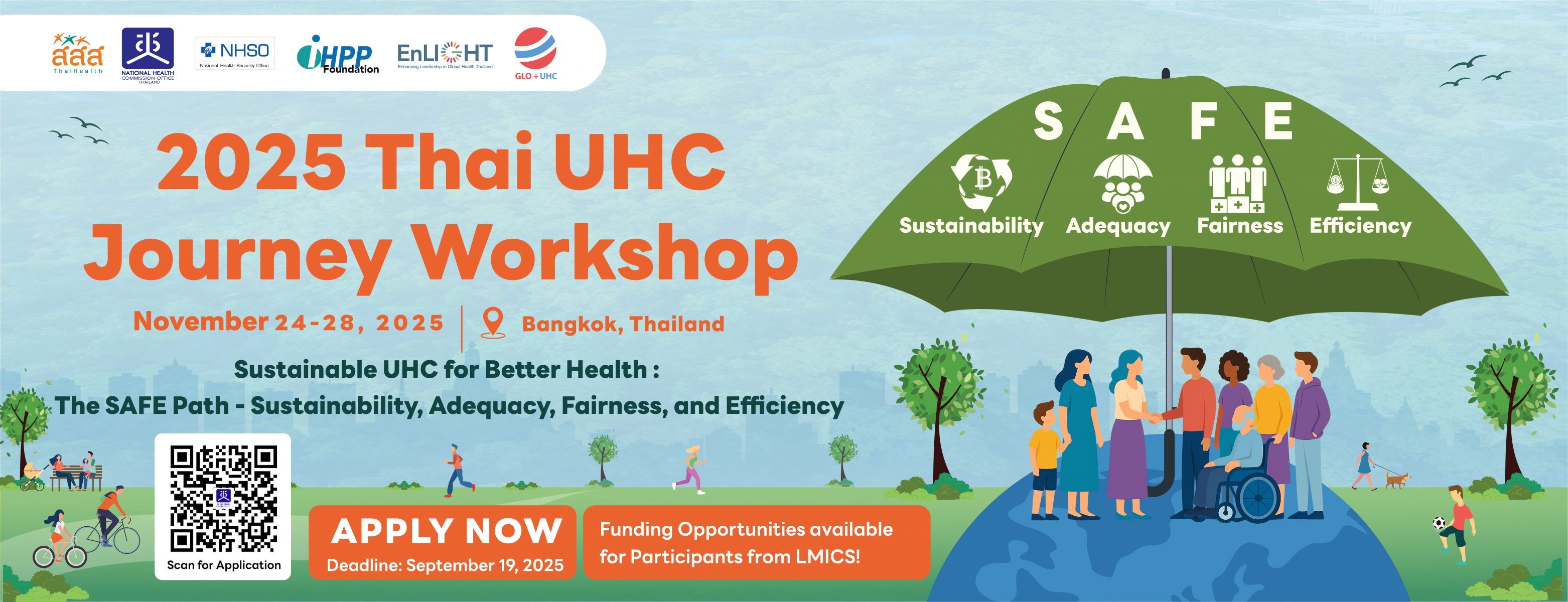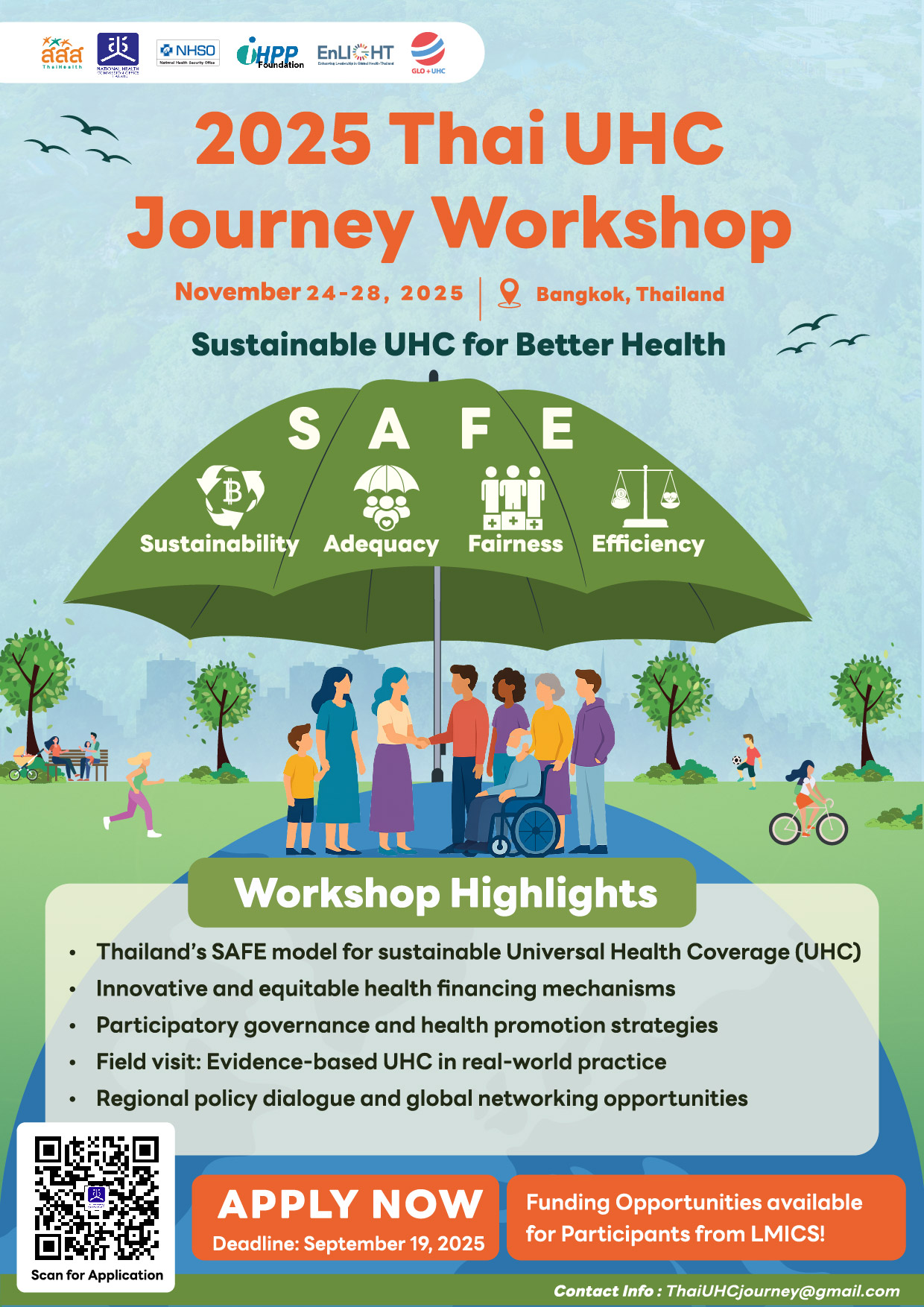
2025 Thai UHC Journey Workshop
Sustainable UHC for better health: The SAFE Path—Sustainability, Adequacy, Fairness, and Efficiency
November 24-28, 2025, at 9.00-16.00 Hrs, Bangkok, Thailand
Background
As the 2030 deadline for achieving the Sustainable Development Goals (SDGs) approaches, the world remains significantly off track to meet SDG Target 3.8, which aspires to universal health coverage (UHC). Coverage of essential health services has stalled, while the proportion of people facing catastrophic health expenditures continues to rise. In 2021, more than 4.5 billion people still lacked access to essential health services, and in 2019, approximately 2 billion people incurred catastrophic or impoverishing health spending due to out-of-pocket payments [1].
Countries are now contending with a convergence of complex global challenges, including demographic transitions, rising healthcare costs, economic instability, climate-related health shocks, and weakening global solidarity. The landscape of global health governance is shifting, characterized by declining official development assistance (ODA), reduced donor commitments, and an increasing reliance on loans that exacerbate debt burdens for low-income countries. These trends underscore the urgent need for innovative and sustainable health financing mechanisms, as well as inclusive governance systems that can adapt to evolving needs and ensure access to care for all.
Since the launch of UHC in 2002, Thailand has made remarkable progress in improving population health, driven by knowledge generation, public engagement, and strong political will. However, the Thai UHC system now faces new pressures brought about by shifting societal dynamics, including population aging, declining birth rates, rapid technological advancement, epidemiological transitions, and economic fluctuations. Key concerns include disparities in access to care due to differences in benefit packages across health insurance schemes, financial sustainability challenges stemming from socioeconomic changes, the need for greater management efficiency, the imperative to maintain quality in medical services, and persistent inequities in healthcare access for remote and vulnerable populations [2,3,4].
These emerging conditions demand that Thailand’s UHC system continue to evolve to remain relevant, responsive, and resilient. The focus must be on ensuring equitable access to quality healthcare, optimizing resource mobilization and utilization, and upholding a health financing system that is sustainable, adequate, fair, and efficient.
Importantly, these challenges are not unique to Thailand. Many low- and middle-income countries are facing similar structural and systemic challenges as they strive to achieve Universal Health Coverage (UHC). Meeting these shared challenges requires sound investment, evidence-informed policymaking, and innovative financing models that strike a balance between sustainability, equity, and efficiency.
The workshop is co-hosted by the National Health Security Office (NHSO), the Thai Health Promotion Foundation (ThaiHealth), the National Health Commission Office (NHCO), and the International Health Policy Program Foundation (IHPP Foundation), along with partner networks such as the Enhancing Leadership on Global Health-Thailand (EnLIGHT) Program under the WHO Country Cooperation Strategy (WHO-CCS), and the GLO+UHC Phase 3 Partnership Project.
The Thai UHC Journey Workshop 2025 is scheduled to take place from November 24 to 28, 2025, in Bangkok, Thailand. It aims to showcase Thailand’s experiences in sustainable health financing and policy innovation while fostering mutual learning and capacity-building among countries striving to build resilient, equitable, and inclusive Universal Health Coverage (UHC) systems.
[1] https://apps.who.int/gb/ebwha/pdf_files/EB156/B156_6-en.pdf
[2] Thailand, U.N.P.F.C.O.i., Impact Demographic Change in Thailand. 2011: UNFPA Thailand
[3] Lorenzoni, A.M.a.L. The impact of technological advancements on health spending: A literature review. OECD Health Working Papers, 2019. No. 113.
[4] Mongkhonsuebsakul, W., Thailand’s Access to Healthcare Services: The reflection and inequality of Vulnerable Group. SAU JOURNAL OF SOCIAL SCIENCES & HUMANITIES, 2022. 1(Jan-Jun 2022): p. 15.
1 Important document
Selected Participants Logistic Information Concept Note & Draft Program Apply Here Confirmation Form Approval Letter

